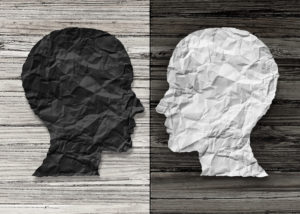Bipolar disorder is a form of mental illness that is marked by extreme shifts in a person’s mood. Those with bipolar disorder experience periods of being overly happy to feelings of extreme sadness and hopelessness.
Bipolar disorder is also known as manic depression. The word “manic” describes the times when someone feels overly excited and confident, while the word “depressive” describes the times when the person feels very sad or depressed. Most people with bipolar disorder spend more time with depressive symptoms than manic ones.
During their “highs” people with bipolar disorder are often restless, act impulsive, speak in a rapid fashion, have an increased sex drive, and are more likely to abuse drugs or alcohol. Conversely, during “the lows” those with bipolar disorder have trouble concentrating, experience changes in their appetite, require an abundance of sleep or experience insomnia, have difficulty making decisions, and experience thoughts of death or suicide.
In bipolar disorder the dramatic episodes of high and low moods do not follow a set pattern. Someone may feel the same mood state (depressed or manic) several times before switching to the opposite mood. These episodes can happen over a period of weeks, months, and sometimes even years. In between these periods, those with bipolar disorder can feel completely normal.
Signs of bipolar disorder typically first become evident during adolescence or young adulthood, but in rare cases the onset can take place during childhood. It is equally prevalent in men and women and can run in families. There is no single known cause for bipolar disease, but changes in genes, brain development and stress are all considered factors.
Diagnosing bipolar disorder is done by a trained mental health professional during an evaluation that will consist of a question and answer period. After ruling out that bipolar symptoms are not due to another cause, a doctor can outline a treatment plan that takes into account the severity, frequency, and length of symptoms.
The good news is there is treatment for bipolar disorder, but it is a long-term and on-going process that requires regular therapy and usually medication management. Medications prescribed are intended to stabilize the patient’s mood and avoid them from experiencing extreme highs and lows.
If you, or someone you love is experiencing symptoms associated with bipolar disorder, seek professional help. To schedule an appointment with a mental health professional at Flushing Hospital, please call 718-670-5562.
All content of this newsletter is intended for general information purposes only and is not intended or implied to be a substitute for professional medical advice, diagnosis or treatment. Please consult a medical professional before adopting any of the suggestions on this page. You must never disregard professional medical advice or delay seeking medical treatment based upon any content of this newsletter. PROMPTLY CONSULT YOUR PHYSICIAN OR CALL 911 IF YOU BELIEVE YOU HAVE A MEDICAL EMERGENCY.

